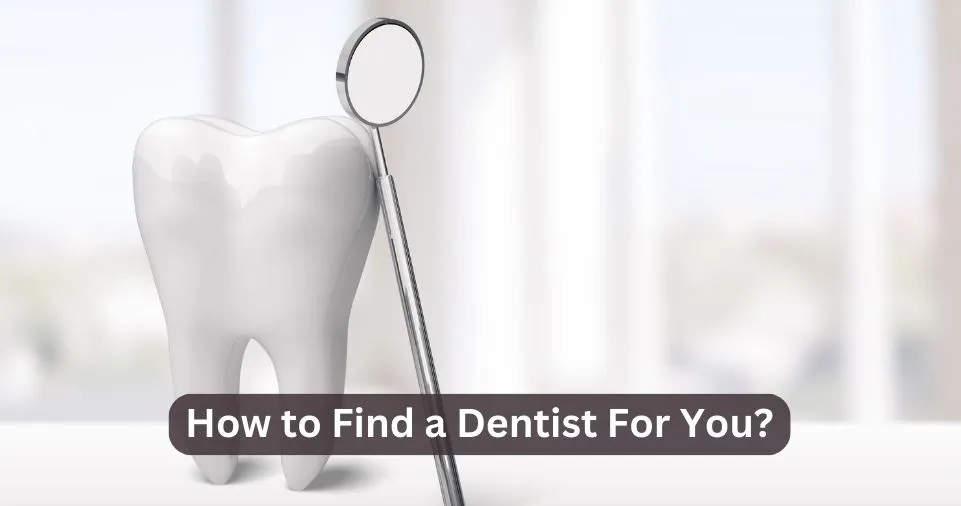Choosing the right dentist is a crucial decision for your health and well-being. A good dentist ensures that your teeth and gums remain healthy, while also providing preventive care and managing any dental problems that arise. However, finding the right one can be daunting, especially with many options available.
Today, at BusinessNewsTips, we will guide you through the process of finding the ideal dentist for you, with each step explained clearly to make the decision-making process easier.
Why Finding the Right Dentist Is Important
Your oral health impacts your overall well-being. A good dentist can detect early signs of oral problems, preventing more serious issues down the line. Regular dental care can also boost your confidence by maintaining a healthy, attractive smile.
Therefore, selecting a dentist you feel comfortable with, and who provides quality care, is essential for long-term health.
ALSO READ: How to Trade CFDs on Forex Markets
Factors to Consider When Choosing a Dentist
When you start your search for a dentist, consider a few key factors. Evaluating these aspects will help you find a dentist who meets your specific needs.
Location and Office Hours
Convenience plays a significant role when choosing a dentist. Look for a dental clinic that is close to your home or workplace. This makes scheduling appointments easier and helps you avoid long travel times.
Additionally, check the office hours. Make sure they are compatible with your daily routine. Some dental offices offer evening or weekend hours, which may be beneficial if you have a busy schedule.
Qualifications and Experience
Your dentist should be well-qualified and experienced in providing the type of care you need. You can check the dentist’s credentials by visiting their website or contacting the dental office.
Look for dentists who are members of professional organizations, such as the American Dental Association (ADA) or other reputable dental boards. These memberships indicate that the dentist stays updated on the latest dental practices and follows industry standards.
Range of Services Offered
Dentists offer a variety of services, ranging from routine check-ups to specialized treatments. When choosing a dentist, ensure they offer the services you require.
General services include cleanings, fillings, and X-rays, but you might also need more specialized care, such as orthodontics, cosmetic procedures, or pediatric dentistry. It’s easier to have a dentist who can handle multiple aspects of dental care, so you don’t need to visit multiple specialists.
Comfort and Communication
It’s important to feel comfortable with your dentist. During your first visit, pay attention to how the dentist communicates. They should take the time to explain procedures clearly and answer any questions you may have.
Good communication is essential for building trust, ensuring that you understand your treatment options and feel in control of your dental care.
Payment Options and Insurance
Dental care can be expensive, so it’s important to understand your payment options. Check whether the dentist accepts your insurance and ask about out-of-pocket costs for services not covered by insurance.
Many dental offices also offer payment plans or financing options to make treatments more affordable. Additionally, inquire about the accepted methods of payment, such as credit cards, checks, or cash.
Steps to Find a Dentist
Now that you know what to look for, let’s walk through the steps to finding the right dentist for you.
Get Recommendations
Start by asking for recommendations. Talk to family, friends, or coworkers who have had positive experiences with their dentists. Personal referrals can provide valuable insights into the dentist’s style, approach, and quality of care.
You can also ask your doctor or pharmacist for a referral, as they often know reputable dentists in the area.
Search Online
If personal recommendations are limited, the internet is a valuable resource. Use search engines to find dentists in your area. Many dental offices have websites that provide details about their services, qualifications, and office policies.
Look for reviews on third-party sites such as Google Reviews or Yelp. These reviews can give you an idea of other patients’ experiences and help you avoid dentists with poor reputations.
Check with Professional Associations
Dental associations, such as the ADA, often have online directories of their members. You can use these directories to find qualified dentists in your area.
These dentists are typically held to high standards of care and ethics, ensuring that you receive professional service.
Schedule a Consultation
Once you have a shortlist of potential dentists, schedule a consultation. Many dentists offer free or low-cost initial visits, allowing you to meet the dentist, tour the office, and ask questions.
During the consultation, observe how the dentist and staff interact with patients.
- Are they friendly and approachable?
- Do they take the time to explain things thoroughly?
This visit will help you assess the dentist’s personality and approach.
What to Ask During Your Consultation
Your consultation is the perfect opportunity to ask questions and gather information. Here are some key questions to consider:
What Are the Dentist’s Qualifications?
You want to know if the dentist has the necessary education and experience to provide the care you need. Ask about their dental school, continuing education, and any certifications they hold.
The more qualified the dentist, the more confident you can be in their ability to provide quality care.
What Is the Office’s Policy on Emergency Care?
Dental emergencies can happen unexpectedly. It’s important to know what kind of emergency care the office provides. Ask if the dentist offers after-hours services or works with another dentist for emergencies.
Understanding how emergencies are handled will give you peace of mind in case you ever need urgent care.
What Are the Costs and Payment Options?
You should have a clear understanding of the costs involved in dental care. Ask for a list of typical fees for common procedures like cleanings, fillings, and X-rays. If you have dental insurance, ask if the office accepts your plan.
Inquire about payment options for uninsured services, such as installment plans or discounts for upfront payments.
What Services Are Offered?
Ensure that the dentist offers the services you need. Some offices focus only on general dentistry, while others provide specialized services such as cosmetic dentistry, orthodontics, or pediatric care.
If you anticipate needing specific procedures in the future, it’s better to choose a dentist who offers those services.
Evaluating the Dental Office Environment
When you visit the dental office, take note of the environment. A clean, organized, and welcoming space is important for your comfort and confidence.
Is the Office Clean and Well-Maintained?
A clean office reflects the professionalism of the staff. Look for signs that the office follows proper sanitation practices.
For example, dental tools should be sterilized, and the waiting area should be neat and clean.
Are the Staff Friendly and Helpful?
The attitude of the staff can make a big difference in your experience. Receptionists, dental hygienists, and assistants should all be polite, professional, and willing to help.
If the staff seems disorganized or unfriendly, it may reflect poorly on the overall operation of the office.
What Technology Does the Office Use?
Modern dental offices often invest in technology to provide more accurate diagnoses and better treatments.
Ask if the office uses digital X-rays, intraoral cameras, or other advanced equipment.
While technology alone doesn’t guarantee good care, it can indicate that the office is committed to providing the best possible service.
Maintaining a Long-Term Relationship with Your Dentist
Once you’ve chosen a dentist, maintaining a long-term relationship is important. Regular visits will help keep your teeth and gums healthy and allow the dentist to monitor any changes in your oral health.
Schedule Regular Check-Ups
It’s recommended to visit your dentist every six months for routine cleanings and check-ups. These appointments help prevent cavities, gum disease, and other dental issues from developing into more serious problems.
If your dentist finds any issues, they can address them before they become more difficult to treat.
Follow Your Dentist’s Advice
After each visit, your dentist will provide instructions for at-home care, such as brushing, flossing, and using mouthwash.
Following this advice will help keep your teeth healthy between visits and reduce the need for additional treatments.
Stay Open to New Treatments
Dental technology and techniques continue to evolve, so your dentist may suggest new treatments over time. Stay open to their recommendations, especially if they involve preventive care or improving your oral health.
A good dentist will explain why a treatment is necessary and how it benefits you in the long run.
ALSO READ: How to Choose the Right Financial Advisor for Your Needs
Conclusion
Finding the right dentist requires research, evaluation, and personal comfort. By considering factors like location, experience, services offered, and communication style, you can narrow down your options and choose a dentist who meets your needs.
Use online resources, recommendations, and consultations to gather information and ensure you’re making the best decision for your health. Once you find the right dentist, maintain a strong relationship by scheduling regular check-ups and following their advice.
Taking these steps will ensure that your dental care is in good hands, giving you peace of mind and a healthy smile for years to come.







